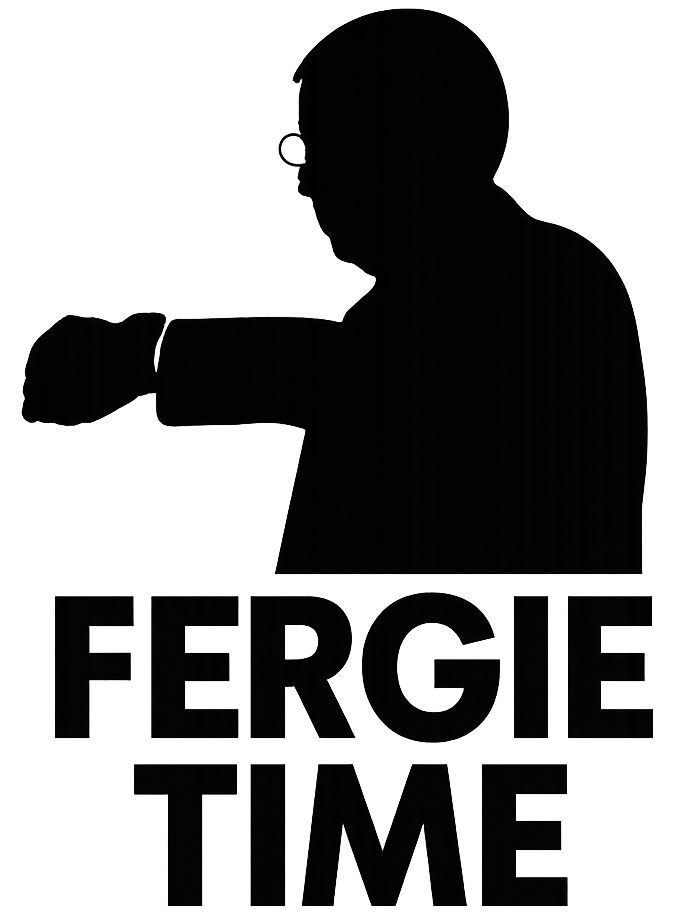Manchester United’s history spans over a century, beginning in 1878 as Newton Heath LYR. This article explores the club’s transformation into a football powerhouse, highlighting key eras like the Busby Babes, the tragic Munich Air Disaster, and the Ferguson revolution in Manchester United history. Discover the iconic players and moments that have shaped Manchester United into one of football’s most storied clubs.
Key Takeaways
- Manchester United began as Newton Heath LYR in 1878, overcoming early financial struggles to become a major football club.
- The club’s growth spurred under manager Matt Busby, leading to iconic moments like the success of the Busby Babes and their first European Cup win in 1968.
- Post-Ferguson, the club faced challenges with managerial changes and mixed performance but achieved recent successes, including a Europa League title in 2017.
The Early Years: Newton Heath LYR
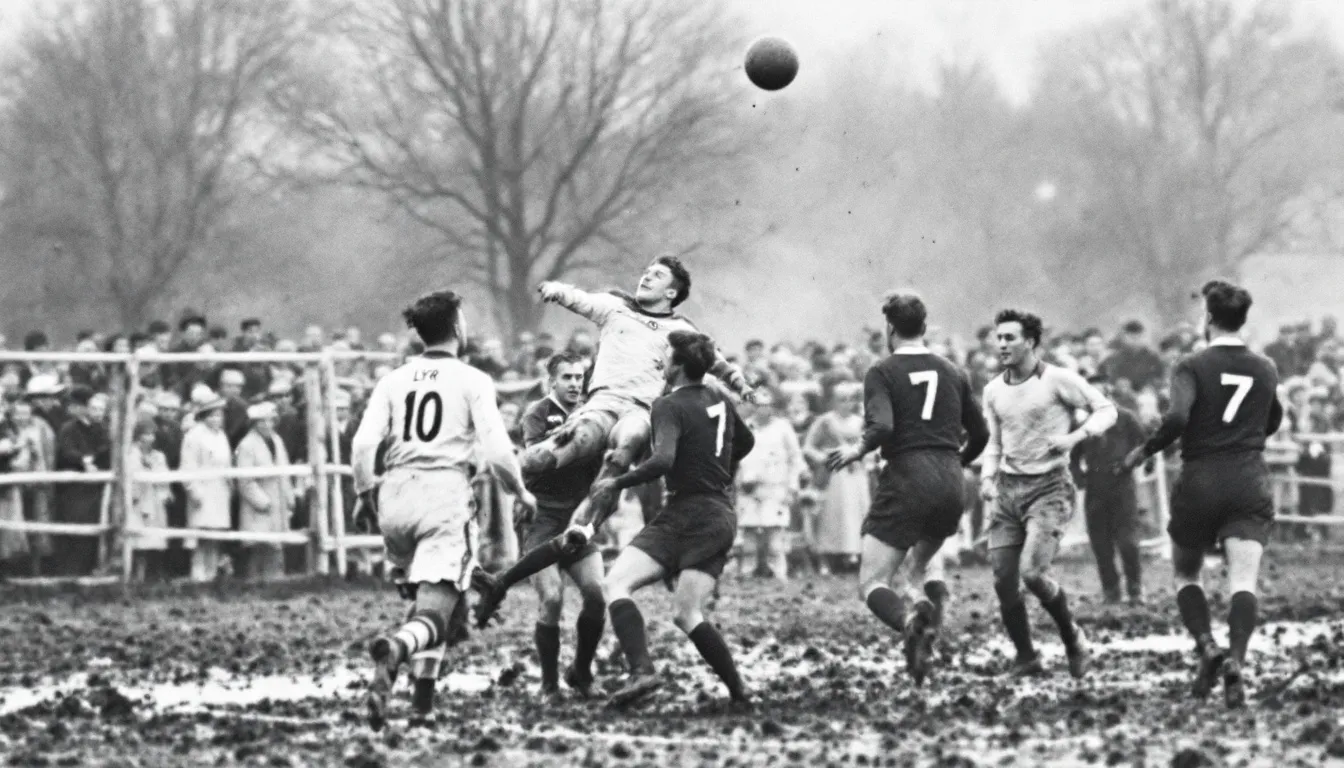
Manchester United’s story begins with a group of railway workers who formed a football team in 1878. Known initially as Newton Heath LYR, this team was the brainchild of the Lancashire and Yorkshire Railway’s carriage and wagon department. The club’s early years were marked by humble beginnings, with the players donning green and gold kits, colors symbolizing their railway roots.
However, the journey from Newton Heath to Manchester United was not without its challenges. Financial struggles loomed large, nearly bringing the club to its knees. Yet, it was through these adversities that the club’s resilience was forged. This period of hardship and transformation set the stage for the club’s eventual rise to prominence.
Formation and Early Matches
Newton Heath LYR Football Club was founded in 1878, marking the beginning of what would become an iconic institution in English football history. Initially named Newton Heath L&YR Football Club, the team adopted green and gold colors to reflect their ties to the railway industry. Their first recorded match, however, was far from a success, ending in a 0-6 defeat to the Bolton Wanderers reserve team.
Despite this rocky start, Newton Heath LYR continued to participate in various competitions, and by 1888, they had become a founding member of The Combination, a regional football league. These early matches and competitions laid the foundation for the club’s future, embedding the resilience and determination that would define Manchester United’s legacy.
Financial Struggles and Name Change
In January 1902, the club faced a financial crisis that threatened its existence. Local businessman John Henry Davies and three other investors stepped in to stabilize the club, marking the beginning of a new era.
On April 24, 1902, the club officially changed its name to Manchester United, signaling a fresh start and a new identity. This transformation paved the way for the Manchester United Football Club to grow into a prominent force in English football, setting the stage for future successes and laying the groundwork for its storied history. Manchester United FC has since become synonymous with excellence in the sport.
Rise to Prominence (1902 – 1945)
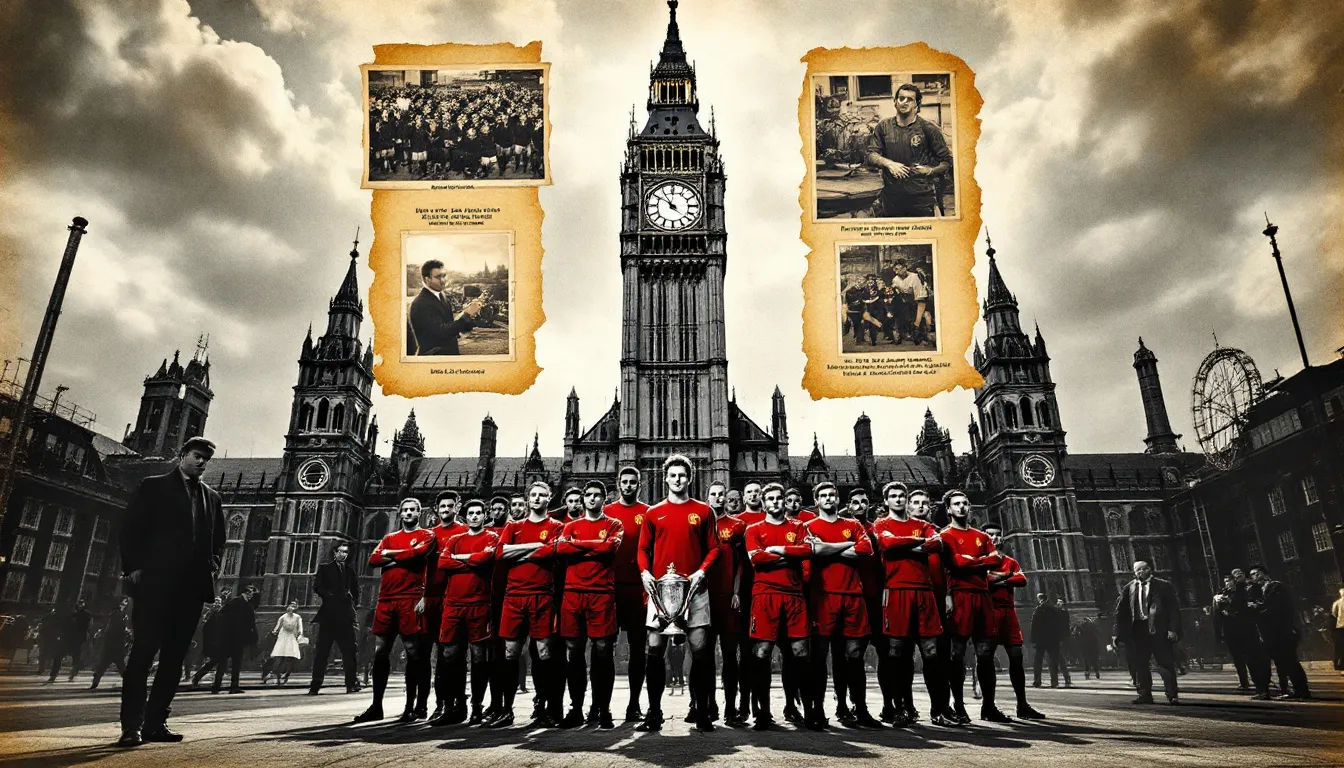
With a new name and renewed vigor, Manchester United began its journey towards becoming a leading club in English football. Emerging from financial instability, the club faced numerous challenges, from economic difficulties to fierce competition from other teams. Yet, these trials only strengthened Manchester United’s resolve, laying a solid foundation for its future accomplishments.
This era was marked by significant achievements that would set the tone for the club’s illustrious future. As Manchester United navigated through these early years, it established itself as a formidable force, ready to conquer new heights in the world of football.
First League Title and FA Cup Victory
Manchester United’s first major triumph came in the 1907-08 season when the club secured its first league title. This victory was a testament to the team’s growing prowess and set the stage for future successes. The following year, in 1909, Manchester United celebrated its first FA Cup victory, further solidifying its place in English football history.
By 1911, Manchester United had clinched the First Division title twice, showcasing their dominance and ambition. These early victories united became the first crucial in establishing Manchester United as a powerhouse in the making, with a legacy that would continue to grow.
World War I Impact
World War I brought significant disruptions to Manchester United, leading to severe financial instability. The war caused many players to enlist, and the club struggled to maintain operations. The financial crisis that had threatened the club’s existence was temporarily alleviated by investments from local businessmen, but the war’s impact was profound, setting back the club’s progress and creating challenges that would take years to overcome.
The Busby Era (1945 – 1969)
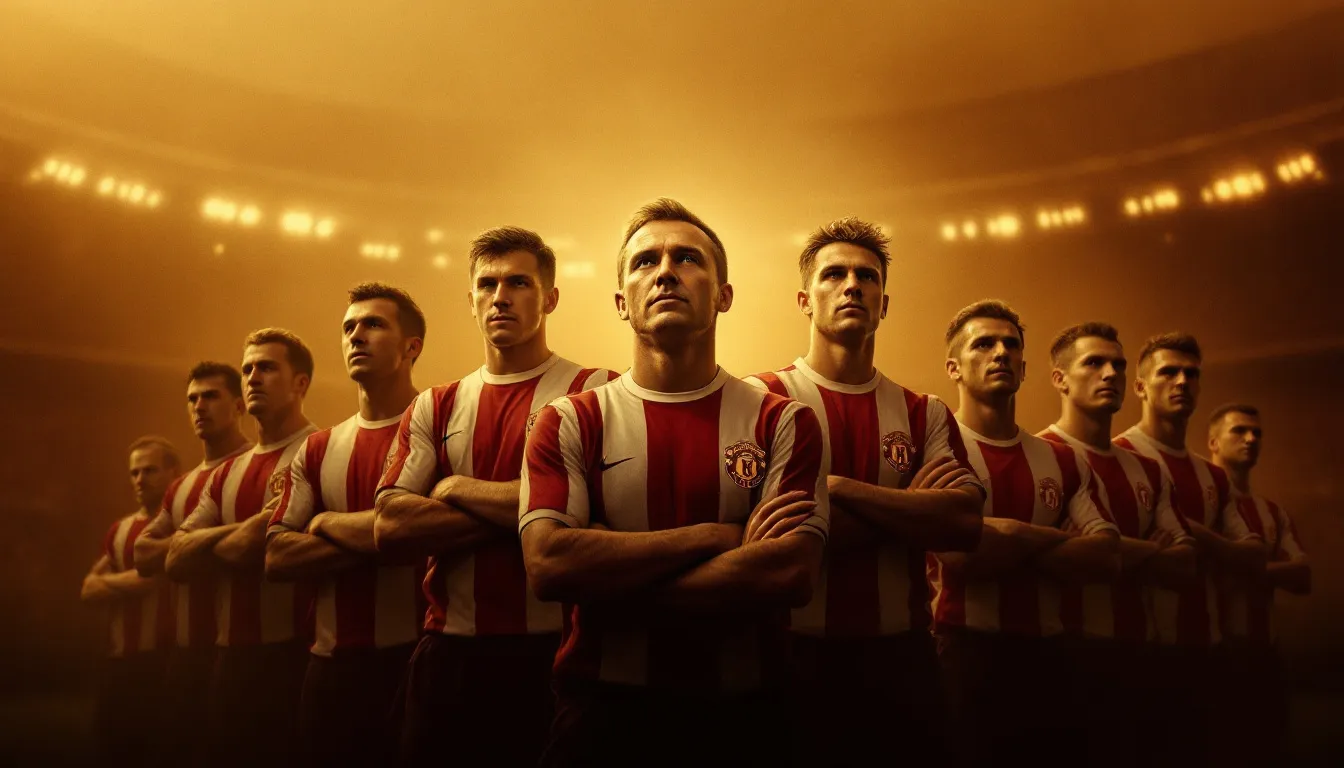
The appointment of Matt Busby as Manchester United manager in October 1945 marked the beginning of a transformative era for Manchester United. Busby’s visionary leadership and emphasis on youth development revolutionized the club, turning it into a football powerhouse. His approach not only brought immediate success but also laid the groundwork for a sustainable model that would influence the club for decades.
Under Busby’s guidance, the club experienced remarkable achievements and heartbreaking tragedies. The period saw the rise of the Busby Babes, the devastating Munich Air Disaster, and the triumphant rebuilding that culminated in European glory. Each of these moments played a crucial role in shaping Manchester United’s identity and legacy.
Building the Busby Babes
The nickname ‘Busby Babes’ was given to the Manchester United team under Matt Busby, due to their young average age and exceptional talent. Busby’s focus on nurturing young players paid off handsomely, as the first team won its first First Division League title under his management in 1952. This success was followed by an FA Cup victory in 1948, further establishing the team’s reputation.
In 1956 and 1957, Manchester United won consecutive league titles, demonstrating the strength and potential of the united squad known as the Busby Babes. These achievements highlighted Busby’s ability to build a team that combined youthful exuberance with tactical brilliance, setting the stage for future successes.
Munich Air Disaster
The Munich Air Disaster in 1958 was a tragic event that claimed the lives of eight Manchester United players. The disaster not only devastated the team but also left an indelible mark on the club’s history. Bobby Charlton, one of the survivors, played a pivotal role in helping the club recover from this tragedy.
Charlton’s contributions extended beyond his skill on the field; he became an inspirational figure for the team and the fans, embodying the resilience and spirit of Manchester United. The recovery from the Munich Air Disaster showcased the club’s ability to overcome adversity and emerge stronger.
Rebuilding and European Glory
After the Munich disaster, Sir Matt Busby focused on youth development to restore Manchester United’s competitive edge. His efforts culminated in the club’s first European Cup victory in 1968, a landmark achievement that showcased Manchester United’s resurgence on the European stage.
Bobby Charlton, a key figure in this success, contributed greatly to the team’s European Cup triumph in 1968 with his exceptional goal-scoring ability and leadership. This victory was a testament to the club’s resilience and Busby’s visionary leadership, cementing Manchester United’s place in European football history.
Post-Busby Challenges (1969 – 1986)
The years following Matt Busby’s departure were marked by significant managerial turnover and inconsistent team performance. The club struggled to maintain the legacy and success that Busby had built, leading to a period of turbulence and transition. This era was characterized by a lack of stability, which had lasting effects on the club’s future direction.
Despite these challenges, Manchester United’s resilience shone through. The club navigated through these difficult times, setting the stage for future successes.
The next subsections will delve into the managerial instability and the relegation and recovery that defined this period.
Managerial Instability
The period after Busby saw a series of managerial changes that reflected the club’s struggle to find stability. Wilf McGuinness, the first manager post-Busby, faced difficulties in maintaining the team’s performance. Tommy Docherty, appointed in December 1972, brought some success but was later succeeded by Dave Sexton, who also struggled to achieve consistent results.
This pattern of instability continued with later managers like David Moyes, Louis van Gaal, and José Mourinho, who each faced their own challenges and varying degrees of success as a team manager and interim manager. The frequent changes in management hindered the club’s ability to build a cohesive and successful team, underscoring the difficulties of this era.
Relegation and Recovery
In 1974, Manchester United faced relegation after a long-standing presence in the top flight of English football. This was a significant blow to the club, highlighting the struggles and instability of the post-Busby years. However, the team’s resilience once again came to the fore.
Manchester United quickly bounced back by winning the Second Division title in 1975, securing their return to the top division. This recovery was a testament to the club’s enduring spirit and determination to reclaim its place among the elite in English football.
The Ferguson Revolution (1986 – 2013)
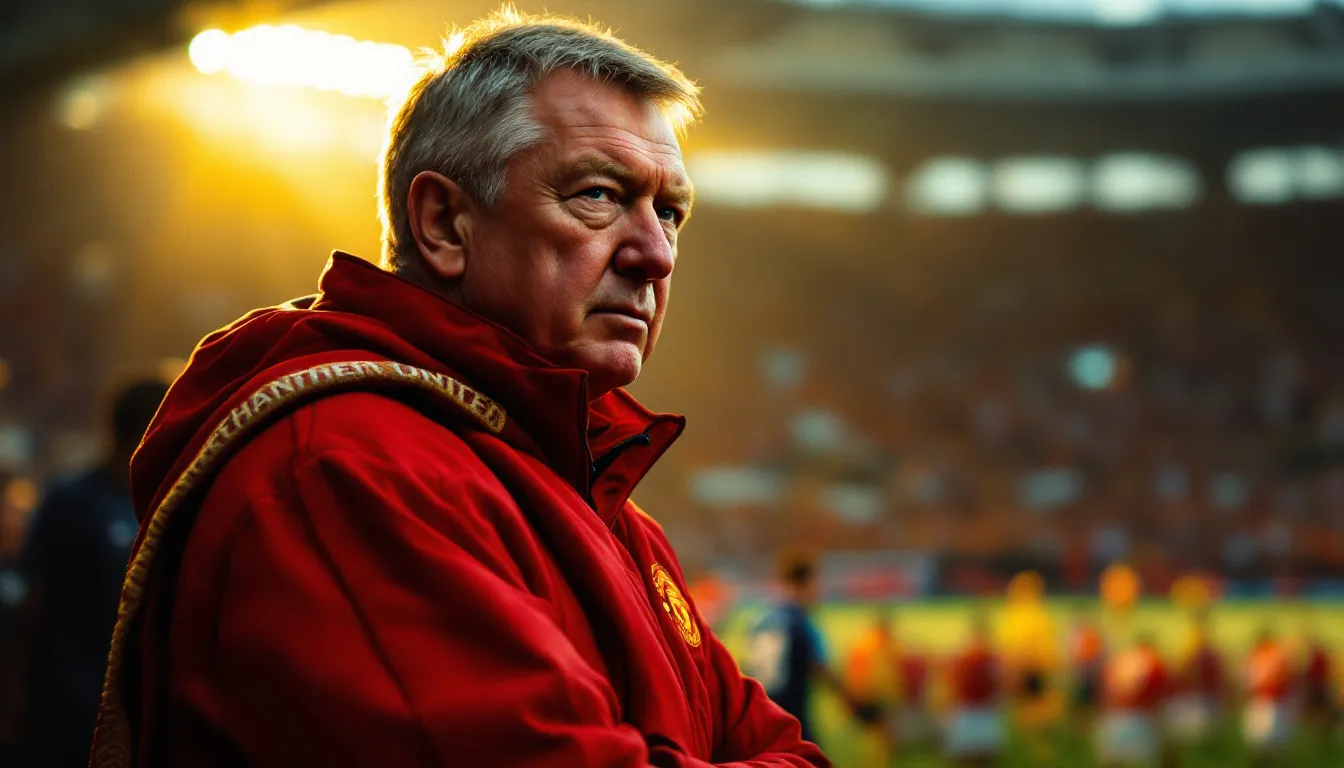
The appointment of Sir Alex Ferguson as manager in 1986 marked the beginning of a new era for Manchester United. Ferguson’s tenure would become synonymous with unprecedented success and transformation. His leadership and vision turned Manchester United into a dominant force in English football, achieving remarkable feats and setting new standards.
Under Ferguson, the club enjoyed a period of sustained success, highlighted by numerous league titles, domestic dominance, and historic achievements. The following subsections will explore the early struggles and breakthrough, domestic dominance, treble triumph, and sustained success that defined the Ferguson era.
Early Struggles and Breakthrough
Ferguson’s early years at Manchester United were marked by challenges and inconsistent performances. However, the FA Cup victory in 1990 proved to be a turning point, marking Ferguson’s first major trophy and boosting team morale. This victory was crucial in establishing Ferguson’s credibility as a manager and laying the groundwork for future successes, including the pursuit of the FA Cup title and the FA Cup final.
With renewed confidence, Ferguson began to build a team capable of competing at the highest level. This breakthrough set the stage for a period of domestic dominance that would see Manchester United become the benchmark for excellence in English football.
Domestic Dominance
Under Ferguson’s guidance, Manchester United achieved a remarkable 13 Premier League titles, cementing their place as the dominant force in English football and league football. The club’s strategic gameplay and consistency were key factors in securing these titles, making Manchester United a formidable opponent.
This era of domestic dominance showcased Ferguson’s ability to build and sustain a winning team. The success during this period not only brought numerous trophies but also elevated Manchester United’s status as one of the most successful clubs in football history.
Treble Triumph
The 1998-1999 season was a historic one for Manchester United, as the club achieved a treble by winning the Premier League, FA Cup, and UEFA Champions League during the premier league season. This remarkable feat made Manchester United the first English club to win a treble, marking a significant milestone in football history, and ultimately, Manchester United finished the season with unparalleled success.
Winning the UEFA Champions League was a crowning achievement, highlighting the club’s success on the European stage. Winning the FA Cup underscored Ferguson’s genius as a manager and the exceptional quality of the team he had built.
Sustained Success
Ferguson continued to add to Manchester United’s honors with multiple league titles and two UEFA Champions League victories after their treble success. The club maintained its dominance in the Premier League, further enhancing its legacy with European victories.
During Ferguson’s reign, Manchester United consistently performed well, adding numerous domestic and European trophies to their cabinet. Overall, Ferguson’s tenure saw Manchester United secure 13 league titles and multiple European accolades, solidifying their place in football history.
Modern Era: Post-Ferguson (2013 – Present)
Since Sir Alex Ferguson’s retirement in 2013, Manchester United has faced inconsistencies and mixed performances in both domestic and European competitions. The transition from Ferguson’s era of dominance to the modern era has been challenging, with the club striving to find stability and success.
The following subsections will explore the managerial changes, Glazer ownership, and recent achievements that have defined Manchester United’s modern era. Despite the challenges, the club remains a competitive force, continually striving to uphold its legacy and achieve new milestones.
Managerial Changes
David Moyes was appointed as Ferguson’s successor, but his tenure was marked by a significant decline in performance, with the club finishing 7th in the league, their lowest position in over two decades. Following Moyes, Louis van Gaal took over and led the team to an FA Cup victory, bringing some success amidst the challenges.
José Mourinho’s time at Manchester United included winning the League Cup and Europa League, with ambitions to expand capacity, maintain success, and hold the club’s legacy.
These managerial changes reflect the club’s efforts to navigate the post-Ferguson landscape and find a formula for sustained success.
Glazer Ownership and Financial Growth
Malcolm Glazer became the owner of Manchester United between 2003 and 2005, leading to significant changes in the club’s financial landscape. Under the Glazer family’s ownership, the club’s revenue continued to grow substantially, reaching around €518 million in the 2013-2014 season.
However, the Glazer ownership has been controversial, leading to protests from fans who are concerned about the financial burden and the direction of the club. Despite the controversy, Manchester United was ranked third among the most valuable football clubs in 2015, highlighting its financial growth and global appeal.
Recent Achievements
In recent years, Manchester United has achieved significant successes, including winning their first Europa League title in 2017. This victory marked an important milestone in the club’s recent history and demonstrated their continued competitiveness in European competition on the European stage.
The club has also secured other notable achievements, such as FA Cup victories, solidifying their position as a competitive force in English football. These recent successes highlight how the club won the FIFA Club World Cup, Manchester United’s resilience and determination to remain at the forefront of the sport.
Iconic Players in Manchester United’s History
Manchester United’s rich history is shaped by numerous iconic players who have left a significant mark on the club. These players have not only contributed to the club’s success but have also defined its identity and culture. The following subsections will highlight the contributions of Bobby Charlton, Ryan Giggs, and Cristiano Ronaldo, three players whose legacies are intertwined with Manchester United’s history.
These legendary figures have each brought their unique talents and dedication to the club, helping to create unforgettable moments and achievements. Their stories are a testament to the club’s commitment to excellence and its ability to produce world-class talent.
Bobby Charlton
Bobby Charlton is regarded as one of Manchester United’s greatest players and a true club legend. During his illustrious career, Charlton scored over 249 goals for the club, making significant contributions to their successes. His skill and dedication on the field were instrumental in establishing Manchester United as a dominant force in English football.
Charlton also played a key role in England’s triumph at the 1966 World Cup, further solidifying his legacy as one of the greatest players in football history. His remarkable achievements and dedicated service to Manchester United have earned him a legendary status, inspiring future generations of players.
Ryan Giggs
Ryan Giggs holds the record for the most appearances for Manchester United, with a total of 963 games played during his career. Giggs’ career at Manchester United spanned over two decades, during which he maintained a consistent level of outstanding performance. His enduring presence and influence have made him a key figure in the club’s history.
Giggs is regarded as one of Manchester United’s greatest players, contributing significantly to the club’s success with his skill, versatility, and leadership. His legacy is a testament to his dedication and the impact he has had on the club’s success.
Cristiano Ronaldo
Cristiano Ronaldo’s initial stint at Manchester United marked the beginning of his ascent to becoming one of the world’s top footballers. During his time at the club, Ronaldo developed from a talented young player into a global superstar, winning three Premier League titles and numerous individual accolades.
Ronaldo’s impact on Manchester United was profound, as he played a key role in elevating the club’s global profile and securing multiple titles. His time at Manchester United was marked by his rapid rise to global stardom, where he won multiple titles and set numerous scoring records.
Old Trafford: The Theatre of Dreams
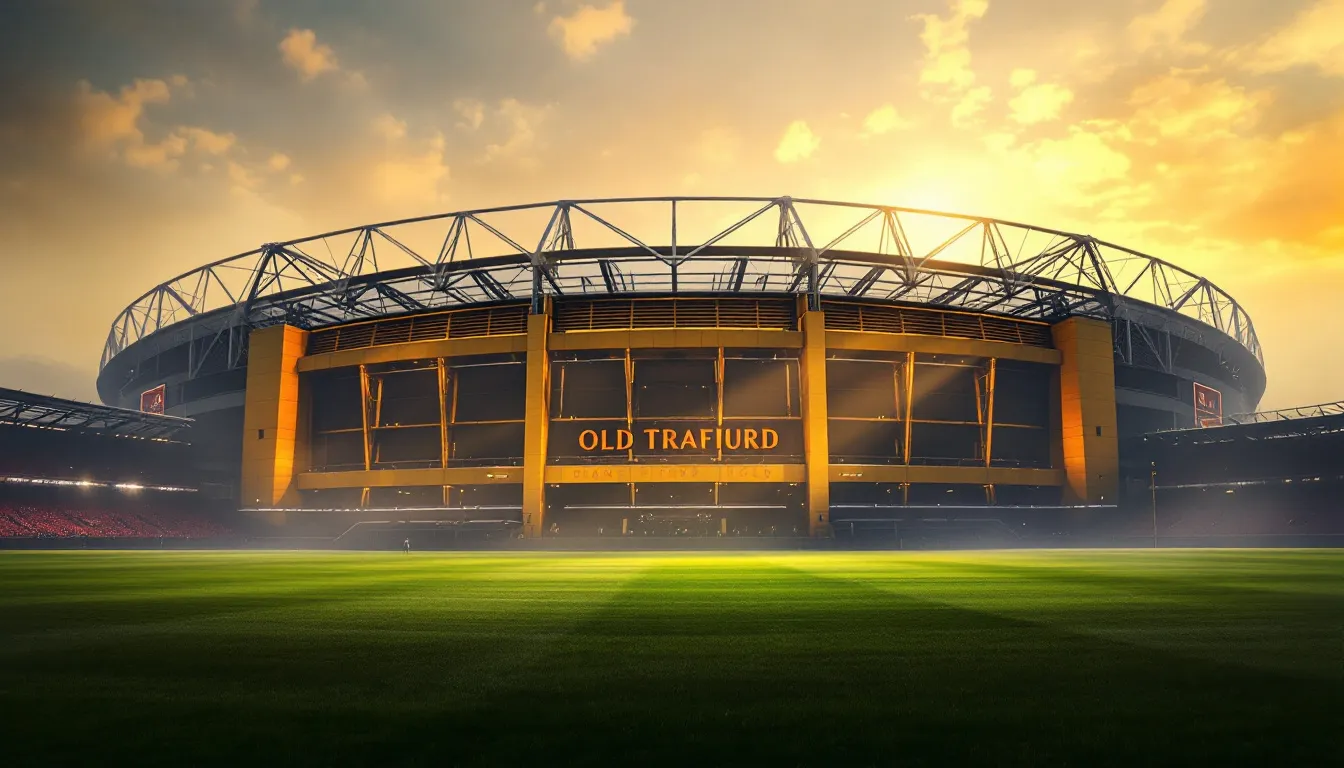
Old Trafford has been an integral part of Manchester United’s identity, evolving into a significant landmark in English football since its inception. Known as the Theatre of Dreams, Old Trafford is the largest club football stadium in the UK, with a capacity of 74,197. Its storied history and numerous memorable matches have made it a revered venue for football fans around the world.
The stadium’s significance extends beyond its size; it embodies the rich history and traditions of Manchester United. The following subsections will explore the construction and early years, as well as the renovations and modernization efforts that have made Old Trafford a premier football stadium.
Construction and Early Years
John Henry Davies donated funds for the construction of Old Trafford, ensuring the club had a proper home. Initially named United Football Ground, the stadium had an original capacity of 100,000. This impressive capacity reflected the club’s ambitions and the growing popularity of football in the early 20th century.
Old Trafford quickly became a significant venue for Manchester United, hosting numerous important matches and events. Its early years were marked by the club’s efforts to establish itself as a leading force in English football, with the stadium playing a crucial role in this journey.
Renovations and Modernization
Old Trafford underwent significant expansions in the 1990s and 2000s, restoring its capacity close to 80,000 through the addition of extra tiers. By 2006, the stadium’s capacity had expanded to accommodate over 76,000 spectators, making it one of the largest stadiums in the UK.
The transformation included the introduction of corporate boxes and the construction of a new North Stand, reflecting its adaptation to modern standards. Floodlights were installed in 1957, enhancing the stadium’s capability to host night matches and increasing its attractiveness for major events.
These renovations have significantly enhanced Old Trafford’s status as a premier football stadium in the UK.
Summary
Manchester United’s history is a tapestry of triumphs, tragedies, and transformations. From its humble beginnings as Newton Heath LYR, the club has evolved into a global football powerhouse. Key moments such as the first league title in 1908, surviving the Munich Air Disaster, and achieving the historic treble in 1999 have all shaped the club’s identity and legacy. Iconic players like Bobby Charlton, Ryan Giggs, and Cristiano Ronaldo have left indelible marks on the club, contributing to its success and global appeal.
As we look back on the journey of Manchester United, it’s evident that the club’s resilience, ambition, and commitment to excellence have been the driving forces behind its enduring legacy. With a storied past and a promising future, Manchester United continues to inspire and captivate football fans around the world. The Theatre of Dreams, Old Trafford, stands as a testament to the club’s rich history and its unwavering pursuit of greatness.
Frequently Asked Questions
When was Manchester United founded?
Manchester United was founded in 1878, originally as Newton Heath LYR. How cool is it that a railway department started such a legendary football club?
What was the significance of the Munich Air Disaster?
The Munich Air Disaster was a huge turning point for Manchester United, as it not only took the lives of eight players but also led to a deep period of mourning and a major rebuilding phase for the club. Survivors like Bobby Charlton became key in helping the team recover and honor their fallen teammates.
How many Premier League titles did Manchester United win under Sir Alex Ferguson?
Manchester United bagged an impressive 13 Premier League titles under Sir Alex Ferguson, cementing their status at the top of English football. That’s some serious dominance!
What are some recent achievements of Manchester United?
Manchester United has pulled off some pretty cool achievements lately, like winning the Europa League in 2017 and claiming the FA Cup title, showing they’re still a competitive force in the game.
Who are some iconic players in Manchester United’s history?
Bobby Charlton, Ryan Giggs, and Cristiano Ronaldo are just a few legendary names that have shaped Manchester United’s history. Their contributions have left an unforgettable mark on the club!

